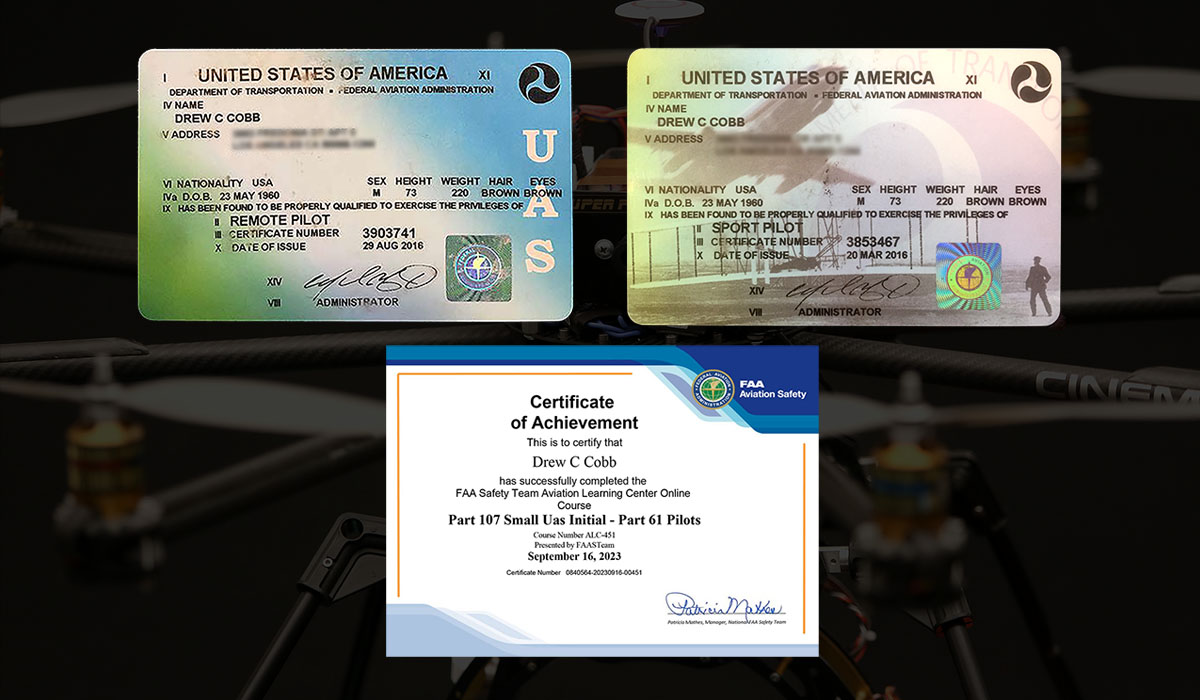My name is Drew Cobb, Dronewrx’s head pilot and I’ve been flying drones since 2013. I was working in video playback and when I saw a Phantom 1, with a GoPro 3 on a mechanical gimbal, I knew what I wanted to do with my life and have never looked back. At the time, there were no schools teaching drones, the drones we flew didn’t even come with cameras or video transmission built in, and there was ZERO FAA regulations. My first few drones didn’t have instruction manuals or online tutorials! You had to count how many times the lights flashed to know if it had marked the home point” In fact, when we needed to land, we hit it with a club and dragged it back to our cave. Ahhhh the good ol’ days….
Now here’s a YUUUUGE issue that I see all too often. Productions only know that they “need a drone” and lump all UAV’s into the same category. There are many drones that could be used and your budget combined with what your final output will be; web? TV? Film? will determine which one you need.
So you don’t need a drone…
Please read the following blog(s) and allow me to impart some of the knowledge I have gained over the past decade+ and you will have narrowed it down, or might know exactly what you need. Or you can reach out and we’ll help you get the right drone/pilot for the right price:
323-899-8400

This may seem redundant to some, but to fly drones commercially, a pilot must hold a current part 107 certificate, AND a bi-annual recertification (pilots are required to pass a written “recertification” test every 2 years). Something called a Part 333 was the first commercial drone license, which also required a licensed pilot to be the PIC (Pilot In Command). Yup, the FAA required an actual pilots license in those early days, and a small number of us passionate individuals went out and got “certificated”. If a pilot has both, you know they’ve been doing this longer and 1000% dedicated, so they’re someone you’d rather be doing business with. You might drop a leading question like: “I heard at one time there was something called a Part 333” and see what kind of response you get.
Step one: You’ll need copy of their qualifications, to get approval. These are things that the Fire Marshall (the people who are tasked with approval of all departments on set) will want to see. On small jobs, there wont be anyone officially checking paperwork, but better for your own protection to work with someone with an actual aircraft insurance policy. On permitted sets there will be someone checking. Then there’s city and state parks which can be even more stickler-sh. Like everything in life, having a good attitude helps. Some people act like having a Part 107 gives them an entitlement to “tell” authorities how it’s gonna go. Agencies with absolute power do not take kindly to jerks and fools. BTW, actual aircraft insurance isn’t cheap.
Here’s a big problem in this industry. This is a very attractive way to earn a living, so there’s always an element of eager green horns, who don’t have a lot of experience and are often willing to undercut and work for peanuts. AKA “the race to the bottom”. And anyone can fly around haphazardly, everything looks cooler from the air. But when there’s timing involved, obstacles, precision, and other pressure from a crew not everyone has the nerve. I often end up directing the shoots, or suggesting shots because I know what works and what editors want. I can do exactly what you want, or make suggestions.
Drones can be an amazing addition to your production; a camera that moves in 3D in the right hands is gold, it’s a dolly, it’s a limitless crane, it’s a helicopter. However, in the wrong hands its an eye-poker-outer buzzing around your talent.
Drone pilots are notoriously bad at filling out paperwork. In fact I’ve heard some producers say “drone pilots don’t do paperwork”. We see that as the first important part of the process, and are very good at it. “If you can’t get approved, it ain’t gonna fly”. It doesn’t hurt that I was a graphic designer for my first career and Photoshop, In Design, Illustrator, are second nature to me. I actually had a Fire Marshall say to me on a Wayfair commercial “This is the the best paperwork I’ve ever received from a drone operator”. Yes, I design my own branding, website and merch.
If you’re working with a film commission, such as Film LA, you’re going to get a list of requirements and the necessity to fill out questionnaires or submit a POA (Plan of Activity), the list seems to grow every year. The way it inevitably happens is last minute, so when you get that email (DUN, DUN DUN) with a list of requirements, your drone operator SHOULD be able to take over and get them what they need within a few hours. The insurance certificate is going to take a a few hours as it’s generated by our insurance agent, but should they need a ‘Waiver of Subrogation’ it will take longer as it’s generated by the underwriter who is on the East Coast. Please don’t ask for one at 4:00 on a Friday!
© Copyright 2017 Dronewrx • All rights reserved